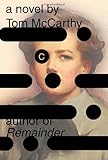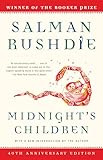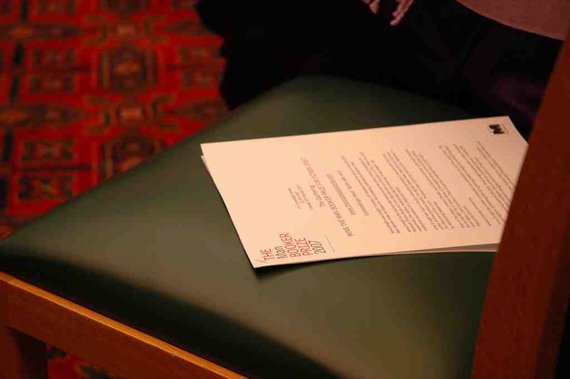Earlier in the week, the longlist for this year’s Man Booker Prize was announced, and the Anglophone news media dutifully sat up straight and took notice. In September the shortlist will be announced, and the news media will sit up even straighter and take even more notice and, for a month or so, fiction — six works of fiction published in the last year, to be exact — will be a more prevalent topic of discussion in the press and online. Already, the customary kvetching about unjustly overlooked books is well underway. In Ireland, where I’m from, the number of our long- and shortlisted compatriots is usually seen as a reliable indicator of the award’s continued relevance. If William Trevor or Anne Enright or Colm Tóibín makes the grade, there is hope yet for the Booker; if not, it is doomed to subside more or less irrevocably into irrelevance. As I write this, The Irish Times already seems to be cracking its knuckles and asking its readership to hold its jacket as it prepares to duke it out over the coming outrage of the shortlist. A report on the longlist points out that Sebastian Barry is “the lone Irishman alongside eight British subjects and three Canadians” (note the subtly politicizing insistence on stressing the British authors’ relationship to their head of state). The article then moves on to discuss the matter of neglected books, drawing the battle lines in historically explicit (and absurd) terms, informing us that “surprise omissions this year amount to a literary Somme.”

 You’ll find similar stuff in most of the major newspapers, at least in Britain and Ireland, where the Booker has the highest level of what I think is referred to, by people who use words like “traction,” as “traction.” This is all pretty harmless stuff, of course — most of us would like the writers we think important to be recognized — and it gets people talking about books, buying them, and maybe even reading them, all of which are good things. But every time there is an announcement about a major literary award, there is always this low tumult of grumbling about all the great writers the judges have “snubbed” (this is usually the verb of choice when it comes to describing the failures of those charged with awarding prizes to books). And I have to admit to being as guilty of this as the next guy, and probably more so. When Tom McCarthy’s C was shortlisted for the Booker last year, I fooled myself into thinking that a) it had a chance of winning the thing and that b) if it did win, it would, more importantly, mark the beginning of a trend toward greater mainstream interest in novels of a non-middlebrow persuasion. When Howard Jacobson’s almost aggressively unremarkable The Finkler Question eventually won, I briefly allowed myself to get irritated about it, as though it were some kind of personal affront that Sir Andrew Motion and his panel of judges had chosen to give a prestigious award to a writer I didn’t much care for over one I did.
You’ll find similar stuff in most of the major newspapers, at least in Britain and Ireland, where the Booker has the highest level of what I think is referred to, by people who use words like “traction,” as “traction.” This is all pretty harmless stuff, of course — most of us would like the writers we think important to be recognized — and it gets people talking about books, buying them, and maybe even reading them, all of which are good things. But every time there is an announcement about a major literary award, there is always this low tumult of grumbling about all the great writers the judges have “snubbed” (this is usually the verb of choice when it comes to describing the failures of those charged with awarding prizes to books). And I have to admit to being as guilty of this as the next guy, and probably more so. When Tom McCarthy’s C was shortlisted for the Booker last year, I fooled myself into thinking that a) it had a chance of winning the thing and that b) if it did win, it would, more importantly, mark the beginning of a trend toward greater mainstream interest in novels of a non-middlebrow persuasion. When Howard Jacobson’s almost aggressively unremarkable The Finkler Question eventually won, I briefly allowed myself to get irritated about it, as though it were some kind of personal affront that Sir Andrew Motion and his panel of judges had chosen to give a prestigious award to a writer I didn’t much care for over one I did.
But here’s the question: why do we even care about this stuff? So Tom McCarthy — or whoever it was you might have wanted to win — didn’t get a prize. Does it really matter? By and large, awards like the Booker are intended to promote solid, well-written, more or less middlebrow fiction — the kind of books that broadsheet newspapers tend to give coverage to. And that’s surely a good thing for the publishing industry, for the literary editors of papers that still have books pages, for the small number of writers who get the nod, for booksellers and (I would guess) for the manufacturers of those stickers that get slapped with startling speed onto the dust jackets of shortlisted titles. But does it really matter at any other level — at the level, for instance, of literary culture as opposed to the publishing industry? I’m not convinced it does.
I recently taught a night course focusing on novels which have won the Booker over the course of its short history. It was a hugely fun class to teach. The students were predominantly in their fifties, sixties, and seventies — retirees, middle-aged professionals and empty-nesters, mainly, who wanted to be better informed on contemporary fiction. The individual novels mostly went over well (albeit with a couple of pretty grim exceptions), but two questions kept coming up again and again in the classes: 1) why are literary awards important? and 2) why do we give so much attention to the Booker Prize specifically? Given that I was teaching the class, it wasn’t unreasonable of them to expect me to be able to answer these questions, but I could never manage anything less lame than “well, literary awards highlight exceptional books — or they’re supposed to, at least — and the Booker Prize is often very controversial, so it gets people talking about fiction, which is positive…” I don’t think the students were especially convinced. I know I wasn’t.


 Reading and discussing certain novels, there was an unavoidable sense of arbitrariness, a sense that these books probably would not be much read had they not won the Booker, and that that might not necessarily have been an unsustainable loss to the literary world. By what reasonable criterion (I found myself obliged to address) could Ian McEwan’s harmlessly diverting Amsterdam, for instance, be considered the best work of fiction published in Britain, Ireland, and the countries of the Commonwealth in 1998? Why had Kingsley Amis won the prize for a pretty dull book called The Old Devils, while his son Martin had never got a look-in for those brilliant ones he wrote in the eighties and early nineties? Could I please explain why anyone could consider Roddy Doyle’s Paddy Clarke Ha Ha Ha (a novel I happen to like quite a lot) even worth talking about? And, most pressingly of all, what the hell was so great about Salman Rushdie’s Midnight’s Children that they had to give it not just the Booker itself in 1981, but also something called The Booker of Bookers in 1993, and then something else called The Best of the Booker in 2008? (I was, and still am, at a complete loss to answer this last question, apart from hazarding that they were perhaps so insecure about their initial choice that they felt a powerful need to overcompensate by reinforcing it in more and more ostentatious ways).
Reading and discussing certain novels, there was an unavoidable sense of arbitrariness, a sense that these books probably would not be much read had they not won the Booker, and that that might not necessarily have been an unsustainable loss to the literary world. By what reasonable criterion (I found myself obliged to address) could Ian McEwan’s harmlessly diverting Amsterdam, for instance, be considered the best work of fiction published in Britain, Ireland, and the countries of the Commonwealth in 1998? Why had Kingsley Amis won the prize for a pretty dull book called The Old Devils, while his son Martin had never got a look-in for those brilliant ones he wrote in the eighties and early nineties? Could I please explain why anyone could consider Roddy Doyle’s Paddy Clarke Ha Ha Ha (a novel I happen to like quite a lot) even worth talking about? And, most pressingly of all, what the hell was so great about Salman Rushdie’s Midnight’s Children that they had to give it not just the Booker itself in 1981, but also something called The Booker of Bookers in 1993, and then something else called The Best of the Booker in 2008? (I was, and still am, at a complete loss to answer this last question, apart from hazarding that they were perhaps so insecure about their initial choice that they felt a powerful need to overcompensate by reinforcing it in more and more ostentatious ways).
A lot of great novelists have won the thing for really excellent novels — Ishiguro, Atwood, Banville, Coetzee (twice) — but spending months reading through so many of the winning books in order to set the reading for the course really impressed upon me how unreliable an indicator of literary importance or comparative quality the prize is per se. And the same is true, to some degree, of all book awards. So why do so many of us get so bent out of shape when they fail to represent what we think of as the best of contemporary fiction? Was it really an outrage that Howard Jacobson had been awarded the Booker over Tom McCarthy, as I fleetingly managed to convince myself last year? No, it wasn’t: it was an anomaly that a wildcard like C had even been shortlisted in the first place. Getting worked up about the fact that really interesting, innovative fiction so often gets ignored by awards judges is, when you think about it, a little bit absurd. I don’t think it’s an injustice that, say, The Minutemen never won a Grammy — it would be frankly odd of me to even bring that up. Why would they have? The idea that that might even matter is somehow quietly insane — they weren’t the kind of band the Grammys were set up to be awarded to, and who cares about the Grammys anyway? And I think a more tempered version of the same stance should probably be taken toward literary awards. They’re great for the publishing industry, they’re great for the handful of writers who win them, and they’re great for the readers who would not otherwise have discovered those writers. But I don’t think anyone in their right mind should be looking for them to accurately reflect what’s really happening — what is truly vital and new and exciting — in contemporary fiction.
The whole idea of awards is not really compatible with serious consideration of literature in the first place. When you read stuff in the press about there being “a strong field” this year, about certain writers not having “made the cut,” and about bookmakers offering punters (i.e., readers) odds on novels, you kind of have to recognize how essentially daft the whole thing is. Writers are not jockeys, books are not horses, and readers are not punters.
That being said, if you’re looking to make a quick buck you could do a lot worse than putting a little something on Alan Hollinghurst to take the Booker this year. I for one think he’s showing some serious form.
Image credit: ThisisHoop/Flickr









